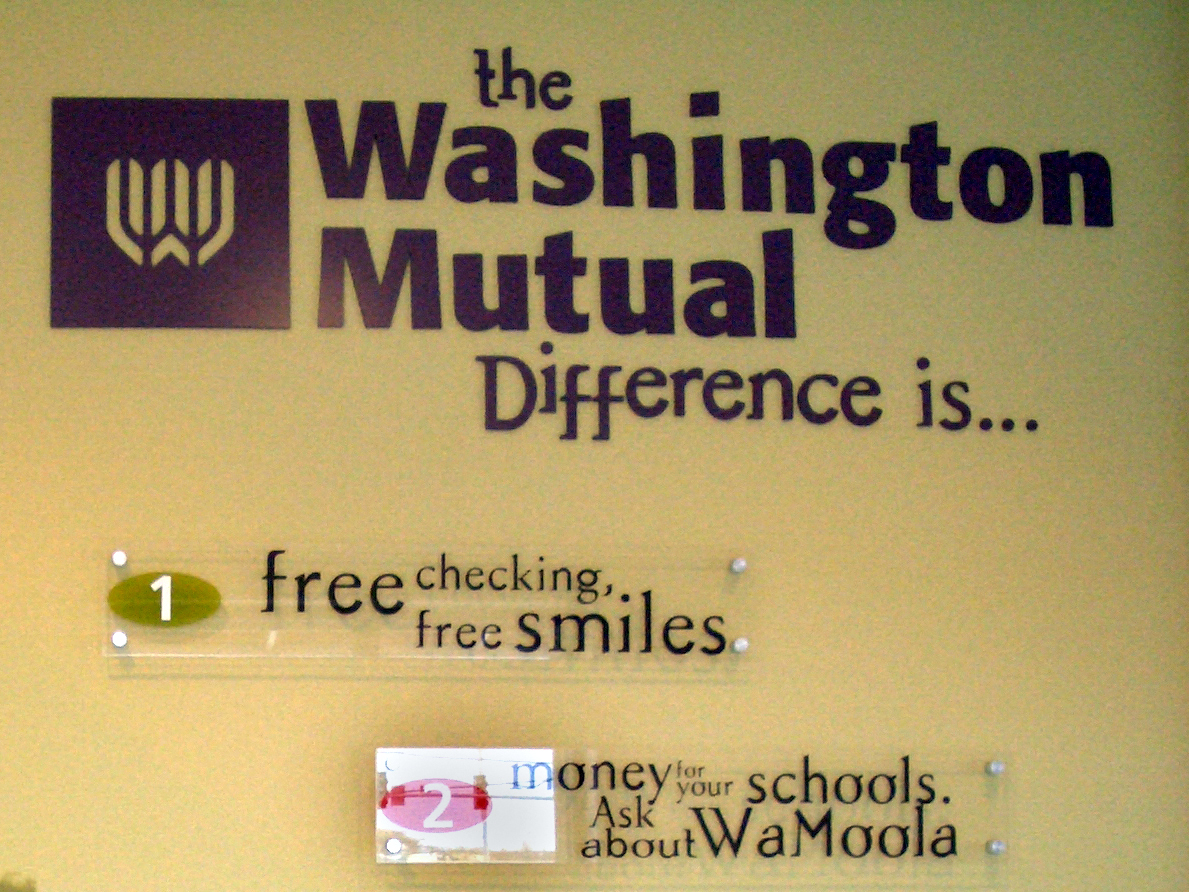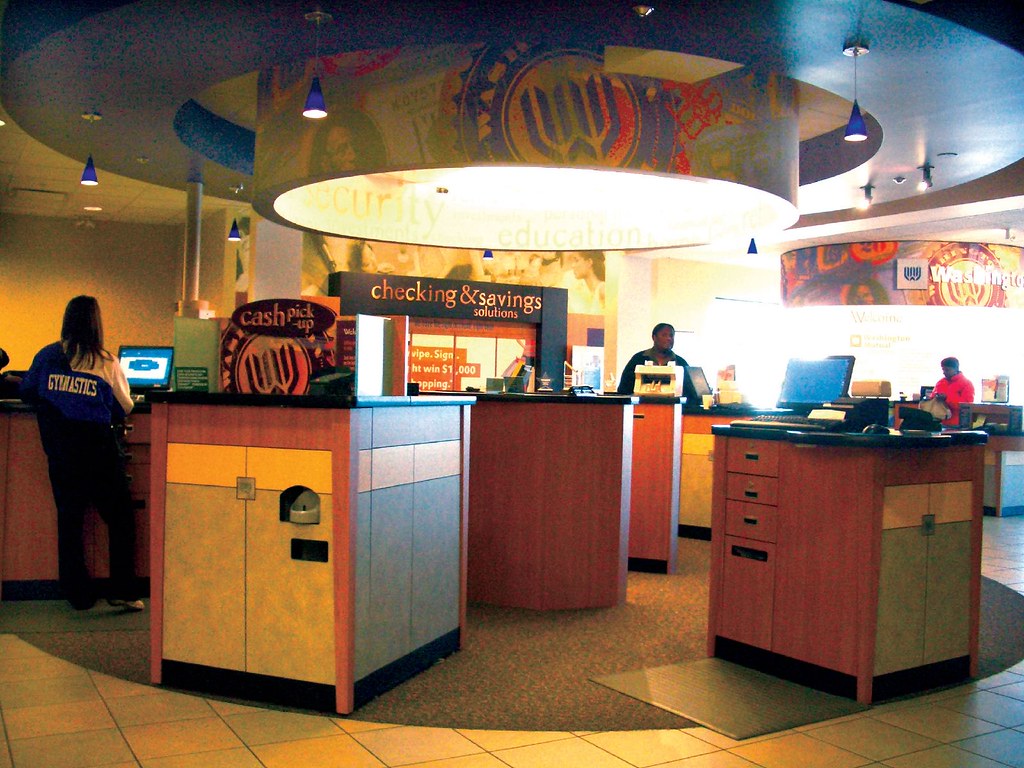 I recently took a major step toward responsible adulthood. I opened a small business checking account. The reason? My boyfriend and I officially registered our side business, Hubwear, and it was time to get serious. No more "we'll figure out the tax thing later" or "do we have to tell someone about this?" We have an Employer Identification Number, we put our legal notice in the paper, we even went to H&R Block. And now, with Washington Mutual at our side, we are the proud cosigners of a Free Business Checking account.
I recently took a major step toward responsible adulthood. I opened a small business checking account. The reason? My boyfriend and I officially registered our side business, Hubwear, and it was time to get serious. No more "we'll figure out the tax thing later" or "do we have to tell someone about this?" We have an Employer Identification Number, we put our legal notice in the paper, we even went to H&R Block. And now, with Washington Mutual at our side, we are the proud cosigners of a Free Business Checking account.Hell yeah.
Now I had more than one reason for choosing WaMu. Of course, we reviewed comparable services from banks in the area. But most had fees somewhere in the fine print, and we are far too savvy to fall for that old gag. Washington Mutual not only had a fee-free option, it was near my office and seemed to be on the rise in Chicagoland. Finally, I'd heard about its "interesting branch designs" and, quite frankly, wanted a closer look.

So I walked into my local branch, and immediately felt displaced. What was this, and where was the bank? I had arrived in a big, open room, where five or six standing-height kiosks were scattered around. There were round counters, round floor patterns and round ceiling fixtures, like everything was swirling around the eye of a hurricane. There were employees standing around the kiosks. There were customers standing around the employees. It looked like a wacky cyclone-themed bar at happy hour.
But it's not quite that crazy - just a little disorienting. You walk in and start scanning the room, when some employee in the back waves her arm and calls, "I can help you over here!" There's no clear path, so you weave through a bunch of kiosks to get to hers. This is fine, I suppose, but I found it strange to not immediately know what to do inside a bank.
This is because most banks have overly entrenched, formulaic protocols for how to act (calm), where to stand (in line), how to talk (quietly) and what to do (nothing. Just make your transaction and leave). Deviations from the protocol are rare. Retail banks reign supreme in the "Because That's How We've Always Done It" department, and surely, I have to presume, they've done it that way for a reason.
And to me, that reason is credibility. You need to trust the place that holds your money. So even though most banks are stodgy, formal and boring, I would rather a stodgy, formal bore hold my money than, well, anyone. Hence the tellers in conservative costume, the organized row of windows, the respectable wood and carpet, and the protocols. "If they have a strict process for making change for a dollar, surely they are strict with my savings."
But the process at Washington Mutual was unlike other banks - it was totally lacking in protocols. Simply put, a protocol is like an implicit agreement between store and customer. We'll do things a certain way, and in return, you'll do things a certain way. But when the store breaks from established protocols, I am left hanging. I have no metaphor, no clues for how to act. At best, I question myself. At worst, I question the store.
---
The lack of protocol was evident at several points in my visit. For example, I expect bankers to be pinnacles of professionalism. They sit properly on their side of the wall, and all I see is a business-suited torso. But as the khaki-clad employee chatted with me at her kiosk, she was visible from head to toe. I could see her comfortable sneakers and sense her casual body language. Should I be breezy with her? Should I make small talk? Wait a minute, was this woman a banker, a teller, or just a minimum-wage employee? Was she knowledgeable about personal finance? Did she even go to college?
I also expect banks to retain some element of secrecy. I want to know that everything is secure, password-protected and locked up tight. But when I sat with the teller at her workstation, her computer screen faced me. It was clearly placed in my line of vision to promote total transparency. But I actually wanted some opacity. Doesn't she keep security codes in there or something? Perhaps some top-secret banking software that I shouldn't see? I felt intrusive and awkward watching her type. (I also wanted some walls - if I could see my new account, couldn't the rest of the room?)
Furthermore, I expect banks to have a "back room," a storage chamber where they keep all the money. While I realize this notion may be outdated, and most money is now digital, I still expect a vault, safety deposit boxes, or at least a private space where rich old ladies can count their millions. But no. I looked all around the room, and there was no back area or special hallway. Upon inquiry, it turns out that money is actually stored inside each of the kiosks. Somehow, that doesn't seem like enough space. "Does this bank just not have that much money?" I thought to myself. That can't be a good customer perception.
The best example of a lack of protocol happened at the very end. I was back at an employee's kiosk, doing something boring like signing forms. Then I finished. Then I stood there, waiting. She was working on her computer. Finally she looked up and said, "Oh, you're done! You're all done. You can go." This moment was utterly bizarre. I was never given the signal that our time here was through. And I kid you not, I had two visits with two different employees, and this exact exchange happened both times.
---
Now just because WaMu defied my expectations, doesn't mean it's bad business. I'm a fan of shifting the paradigm, especially in antiquated industries, and if WaMu wants to be more like a retailer, and less like a bank, that's cool. The patented design, called Occasio, is supposed to create a comfortable, welcoming environment - a place "where [people] want to go, rather than have to go." Who can argue with that?
But I found the place to be so unlike a bank, that I began to question its credibility as a financial institution. And that is the line they most certainly do not want to cross.
I'd recommend adding back in some of the traditional banking cues. Just a few. Like building a tiny wall around employees, so to speak, so they are both important and confidential. Give their desks some privacy and their outfits some authority. Give them more prominent titles. Store the money in some perimeter fixture or machine. Give it a little more space. And finish the transaction with a gesture. Something that signifies the end and brings closure. Hand me a lollipop, for goodness sake!
I know WaMu is simply listening to its customers, staying in touch with the trends of accessibility and demystification. I just want them to remember that as long as they offer checking accounts, they are still a bank. I'm simply asking them to show me the bank.

1 comment:
Very creative post.
Post a Comment